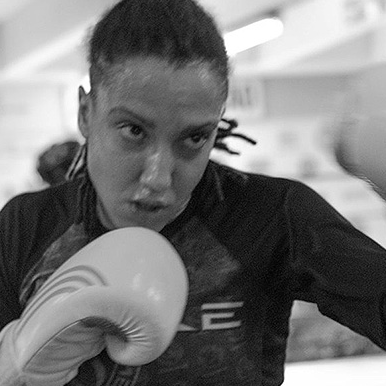The following is a post by our longtime friend, Nico Ball. There's a short bio after the article and you can also keep track of her on her own blog.
You climb the stairs, slip through the ropes, and step onto the canvas to see your opponent waiting stoically in the opposite corner. The crowd is pulsing around you. The lights are blaring down upon you. And while the final seconds count down before the contest begins, you try to remain focused and relaxed. Once the bell sounds to start the bout, your breath suddenly catches heavy in your chest, your eyes dial in on your opponent, and you seem to float across the ring. Despite the hours of training you’ve endured at the gym, it only takes a few minutes of battle before your muscles begin to feel paralyzed with exhaustion.
What you’re experiencing is an acute stress reaction, often called an adrenaline dump. Your brain perceives the situation as potentially threatening, and this perception causes high levels of epinephrine to be “dumped” into your bloodstream in preparation for action! You’ve heard of the “fight or flight” mechanism. Well, this is it. And the exhausting act of your body pumping hormones into your body becomes a major obstacle to your achieving peak performance. Women, especially, experience heightened levels of anxiety in intense situations, exacerbating the problem.
As a fighter, it’s important to understand that the adrenaline dump is a natural biochemical reaction that your body produces in response to stress and anxiety. The good news, therefore, is that, just like any other physiological response, it can be addressed and treated.
The first step to counteracting adrenaline dump is to control your breathing. This is something that you should work on in training leading up to the fight, and not just once you feel the butterflies. During training you should attempt to establish a constant breathing pattern: inhaling deeply through your nose, pausing to hold the air, and then exhaling through your mouth. Use this same method to regain your calm: hold each phase for several seconds and make sure to fill your lungs entirely and not just the shallow, upper portion of your lungs. The deep breaths will help carry more oxygen to the rest of your body and will help counteract the fight or flight mechanism that is getting you revved up too high.
Developing mental discipline is another important facet of boxing that you should be working on during training. Focus is an essential tool for anyone that wants to master an art, especially one as mentally exhausting as fighting. By design, combat training is learned by rote in order to build kinesthetic memory, which in turn, makes your reactions become second nature and allows you to focus your mental energy on your fight.
It can be easy to lose focus when training gets repetitive, but establishing focus in the gym will help you stay focused in the ring. Learning to control your concentration during training will help you reign in feelings of anxiety that will trigger the adrenaline dump. So, the next time you find your mind wandering in the middle of drills, take a deep breath and refocus all of your energy on a very specific training goal or objective.
You can also try teaching your mind to perceive situations, that may otherwise provoke fear and anxiety, as an exciting new challenge, thereby mitigating the psychological effect of adrenaline dump before it even starts.
Even though you’ve prepared amply in training, it’s natural, even for experienced fighters, to feel a little nervous. Physical activity will help cut the edge of your nerves, that’s why its important to make sure you get in a good warm up before fighting. MiKiDo Mixed Martial Arts Centers trainer Rob O’Heran recommends that his fighters complete a full workout in the morning before competing in order to desensitize your body to the effects of adrenaline when it comes time to compete later that day.
Making sure to address both the mental and the physiological facets of boxing competition will give fighters an added advantage when entering the ring. Instead of being tormented by overly rambunctious nerves, a skilled fighter experiences what Cappy Kotz from Cappy’s Gym in Seattle describes as, “…that delicious moment when all notions of doing things correctly fades away to the performance itself. [You] see the punches way before they arrive and [your] training instinctively makes the necessary adjustments to handle the situation.” This transcendental state of mind, described by Cappy, is what athletes call being “in the zone”.
There is no step by step guide as to how to reach “the zone”, but one thing is for sure: practice makes perfect. The more competition experience you gain, the easier it will be to manage ring anxiety and maintain mental calm and focus. It is important to remember that muscles are amazing, but the mind is primary. Eventually, psychological resiliency will put a “boxer” ahead of mere “physical fighters.”
The ability to remain calm in the storm is indispensable, especially in a sport as mentally and physically exhausting as boxing. Not to worry, it’s normal to feel nervous in the ring. Heck, most fighters forget large portions of rounds because they are so hyped up!
Ellen Marcus from MiKiDo Mixed Martial Arts Centers said that it felt like she was in a dream the first time she stepped into the ring. Despite losing her first fight on points (after breaking her nose in the second round), she got right back in the gym with her trainer and they began working on mental and physical strategies to prepare her for her next confrontation. There is nothing more exhilarating than having your hand raised in victory, but in the end, it's the relentless spirit and willingness to confront personal fears, come hell or high water. That is what truly defines a champion.
Dan Behring
Nico Ball recently left her life as a teacher to train mixed martial arts full-time in Brazil. Originally from Pennsylvania, she attended George Mason University in Virginia and received her Masters degree studying the impact of martial arts-based social projects. She’s now living the fighter’s life and pursuing her dream to become a pro mixed martial artist.
Additionally, Nico has found a way to continue her interest in creating social change by helping organize The Tererê Kids Project, a nonprofit for the children living in poverty in the favela of Morro do Contagalo. You can keep up with Nico through her blog as she trains and competes in MMA, Muay Thai, and Boxing alongside one of the world's fastest growing female fight teams, Parana Vale Tudo (PRVT).











